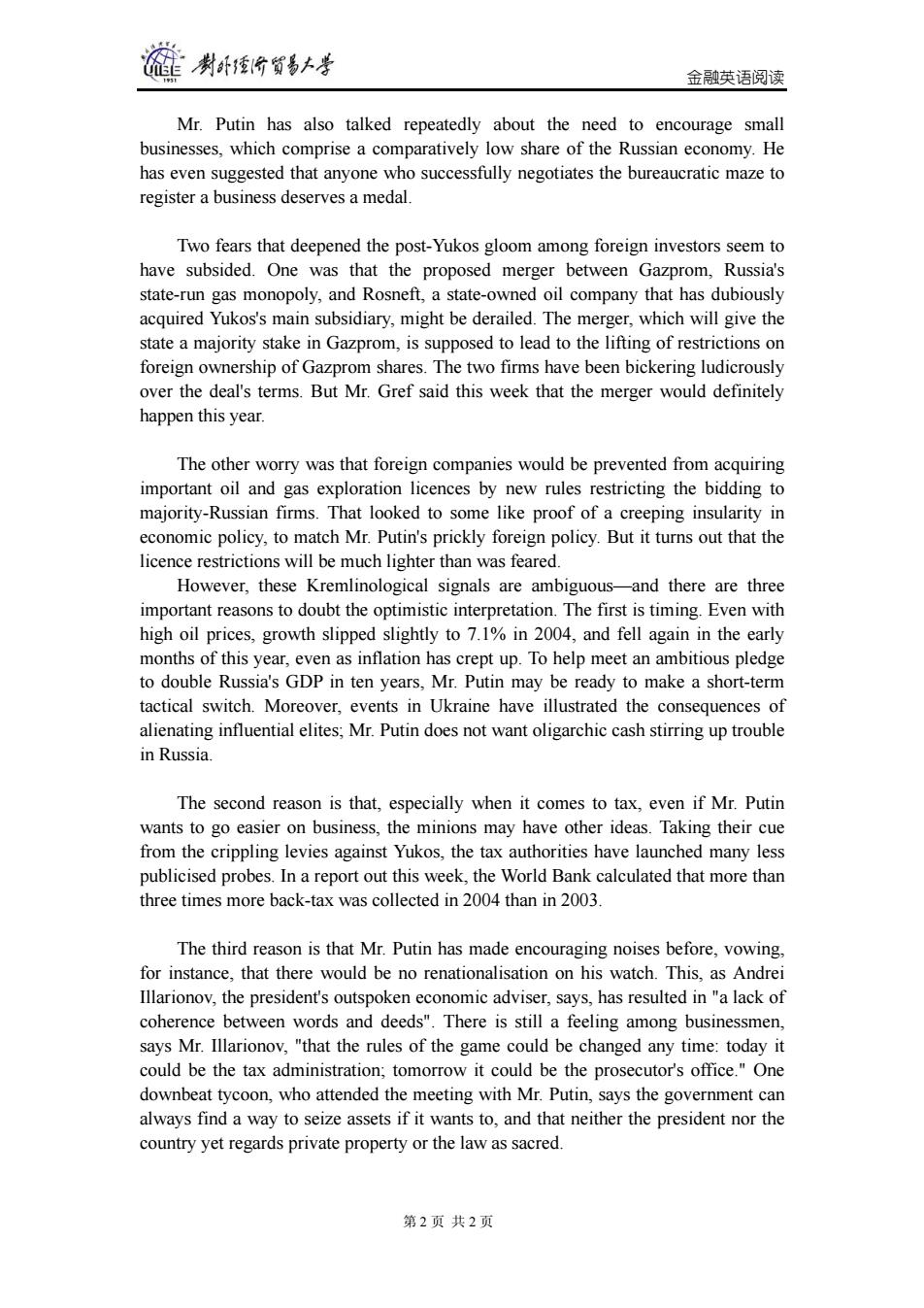正在加载图片...

制卧份贸易+学 金融英语阅读 Mr.Putin has also talked repeatedly about the need to encourage small businesses,which comprise a comparatively low share of the Russian economy.He has even suggested that anyone who successfully negotiates the bureaucratic maze to register a business deserves a medal. Two fears that deepened the post-Yukos gloom among foreign investors seem to have subsided.One was that the proposed merger between Gazprom,Russia's state-run gas monopoly,and Rosneft,a state-owned oil company that has dubiously acquired Yukos's main subsidiary,might be derailed.The merger,which will give the state a majority stake in Gazprom,is supposed to lead to the lifting of restrictions on foreign ownership of Gazprom shares.The two firms have been bickering ludicrously over the deal's terms.But Mr.Gref said this week that the merger would definitely happen this year. The other worry was that foreign companies would be prevented from acquiring important oil and gas exploration licences by new rules restricting the bidding to majority-Russian firms.That looked to some like proof of a creeping insularity in economic policy,to match Mr.Putin's prickly foreign policy.But it turns out that the licence restrictions will be much lighter than was feared. However,these Kremlinological signals are ambiguous-and there are three important reasons to doubt the optimistic interpretation.The first is timing.Even with high oil prices,growth slipped slightly to 7.1%in 2004,and fell again in the early months of this year,even as inflation has crept up.To help meet an ambitious pledge to double Russia's GDP in ten years,Mr.Putin may be ready to make a short-term tactical switch.Moreover,events in Ukraine have illustrated the consequences of alienating influential elites;Mr.Putin does not want oligarchic cash stirring up trouble in Russia. The second reason is that,especially when it comes to tax,even if Mr.Putin wants to go easier on business,the minions may have other ideas.Taking their cue from the crippling levies against Yukos,the tax authorities have launched many less publicised probes.In a report out this week,the World Bank calculated that more than three times more back-tax was collected in 2004 than in 2003. The third reason is that Mr.Putin has made encouraging noises before,vowing, for instance,that there would be no renationalisation on his watch.This,as Andrei Illarionov,the president's outspoken economic adviser,says,has resulted in "a lack of coherence between words and deeds".There is still a feeling among businessmen, says Mr.Illarionov,"that the rules of the game could be changed any time:today it could be the tax administration;tomorrow it could be the prosecutor's office."One downbeat tycoon,who attended the meeting with Mr.Putin,says the government can always find a way to seize assets if it wants to,and that neither the president nor the country yet regards private property or the law as sacred. 第2页共2页金融英语阅读 Mr. Putin has also talked repeatedly about the need to encourage small businesses, which comprise a comparatively low share of the Russian economy. He has even suggested that anyone who successfully negotiates the bureaucratic maze to register a business deserves a medal. Two fears that deepened the post-Yukos gloom among foreign investors seem to have subsided. One was that the proposed merger between Gazprom, Russia's state-run gas monopoly, and Rosneft, a state-owned oil company that has dubiously acquired Yukos's main subsidiary, might be derailed. The merger, which will give the state a majority stake in Gazprom, is supposed to lead to the lifting of restrictions on foreign ownership of Gazprom shares. The two firms have been bickering ludicrously over the deal's terms. But Mr. Gref said this week that the merger would definitely happen this year. The other worry was that foreign companies would be prevented from acquiring important oil and gas exploration licences by new rules restricting the bidding to majority-Russian firms. That looked to some like proof of a creeping insularity in economic policy, to match Mr. Putin's prickly foreign policy. But it turns out that the licence restrictions will be much lighter than was feared. However, these Kremlinological signals are ambiguous—and there are three important reasons to doubt the optimistic interpretation. The first is timing. Even with high oil prices, growth slipped slightly to 7.1% in 2004, and fell again in the early months of this year, even as inflation has crept up. To help meet an ambitious pledge to double Russia's GDP in ten years, Mr. Putin may be ready to make a short-term tactical switch. Moreover, events in Ukraine have illustrated the consequences of alienating influential elites; Mr. Putin does not want oligarchic cash stirring up trouble in Russia. The second reason is that, especially when it comes to tax, even if Mr. Putin wants to go easier on business, the minions may have other ideas. Taking their cue from the crippling levies against Yukos, the tax authorities have launched many less publicised probes. In a report out this week, the World Bank calculated that more than three times more back-tax was collected in 2004 than in 2003. The third reason is that Mr. Putin has made encouraging noises before, vowing, for instance, that there would be no renationalisation on his watch. This, as Andrei Illarionov, the president's outspoken economic adviser, says, has resulted in "a lack of coherence between words and deeds". There is still a feeling among businessmen, says Mr. Illarionov, "that the rules of the game could be changed any time: today it could be the tax administration; tomorrow it could be the prosecutor's office." One downbeat tycoon, who attended the meeting with Mr. Putin, says the government can always find a way to seize assets if it wants to, and that neither the president nor the country yet regards private property or the law as sacred. 第 2 页 共 2 页